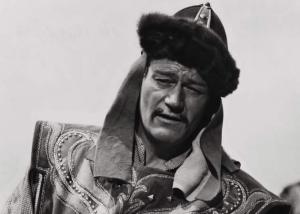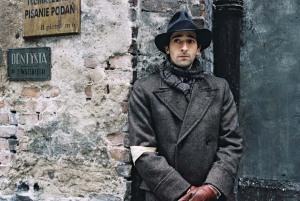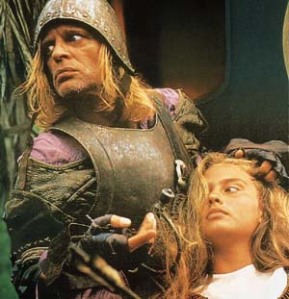
Christoph Waltz in 'Inglourious Basterds'
There’s a nice moment early in the 1983 Mel Brooks film To Be or Not To Be when the dialogue suddenly switches from one language to another. Brooks and his co-stars play a troupe of Polish actors, caught in Warsaw during the Nazi occupation. In the first scene, as the curtain of their theatre goes down after a performance, the actors hold a panicky behind-the-scenes conference in gabbled, subtitled Polish. “Can’t we just switch to English?” someone suggests. The actors sigh with relief and, for the rest of the film, everyone speaks in American-accented English.
It’s a good joke, and one that highlights a problem that English-speaking directors face when making films for English-speaking audiences about non-English-speaking people. Do you employ local actors and subtitle everything? Or do you throw realism to the wind and cast, say, Ray Winstone as a gondolier or Tom Cruise as a Nazi?
In his recent World War Two fantasy Inglourious Basterds, Quentin Tarantino plumped for the first option, hiring French- and German-speaking actors alongside Americans and Brits. But by doing so, the director was bucking a long-established war movie tradition.
Go back to almost any Second World War film from the ‘50s or ‘60s, and you’ll find Nazis speaking to one another in heavily-accented English, only occasionally remembering to throw in the odd “ja vohl” or “achtung Englander!” to remind everyone that they are, in fact, supposed to be German. Similarly, John Wayne opted not to learn 13th Century Mongolian for his turn as Genghis Khan in The Conqueror, and no-one in Fiddler on the Roof seemed to be too worried about singing Yiddish-themed show tunes in a hammed-up, ahistorical English.

John Wayne as 'The Conqueror'
The sillier the film, the less problematic the lack of language realism: that seems to be the rule here. If we don’t have to take a film seriously on any level, then the fact that everyone’s speaking the wrong language is neither here nor there. The film-makers who really come unstuck though are the ones who want us to take them seriously; the ones with something to say.

Adrien Brody in 'The Pianist'
In Paths of Glory Kirk Douglas plays a French army officer in the First World War who finds himself defending troops facing a court martial for disobeying suicidal orders. Now, you might spot the problem here straight away: Kirk Douglas doesn’t look in the slightest way French. No-one could look less French than Kirk Douglas! And, to his credit, the actor doesn’t stick on a beret midway through the film, or attempt a René-from-‘Allo-‘Allo accent. Political sensibilities aside – in 1957 there were still plenty of First World War veterans around – wouldn’t it have been better for Kubrick to transfer the story to the British or American trenches?
This isn’t just an Anglophone issue either. In Werner Herzog’s Aguirre – Wrath of God, Klaus Kinski plays a conquistador searching for a mythical city of gold in Latin America. Aguirre is a great film, in many ways out Apocalypse Now-ing Apocalypse Now, but by no stretch of the imagination do Kinski and his blond, moustachioed henchmen look Spanish. Boris Becker looks more Spanish than Kinski! Plus everyone speaks German, which kind of gives the game away.

'Aguirre - Wrath of God'
More recently, in Michael Haneke’s The Piano Teacher, a Franco-Austrian co-production, everyone speaks French. That’s fair enough until you realise that the film is set in Vienna and everyone in it is supposed to be Austrian. Can the characters read the German street signs that they walk past? Do they know that they’re speaking French? The lack of logic here is as distracting as it is distressing, which is a shame because, again, The Piano Teacher is a very good film. Why, if Haneke was shooting in Austria, did he not use Austrian actors? Or if he particularly wanted to work with Isabelle Huppert, why not transpose the story to France? I haven’t had the chance to ask him yet, but when I do, we’ll be having words…
Language, then, is certainly a thorny issue in the movies. In an ideal world, more directors would follow the example of Mel Gibson – yes, Mel Gibson! – who insisted on his actors speaking Aramaic and Latin in The Passion of The Christ and Yucatec Maya in Apocalypto. Until then, audiences will just have to grit their teeth and put up with the RADA Romans and Hollywood Nazis that are sent their way.
Try to believe just a little, if you can.
“Valkyrie” deals with this ‘problem’ very nicely as it starts in German and then transitions into English.
As for directors making films set in foreign locals but using their native language – one very practical reason would be ease/control of direction, as it’s much harder to judge/guide a performance in a language one does not understand.
i like war movies and inglourious basterds is one of the movies that i really love -~~
[…] Mind Your Language September 2009 2 comments Draper thinks about smoking a fag 4 […]